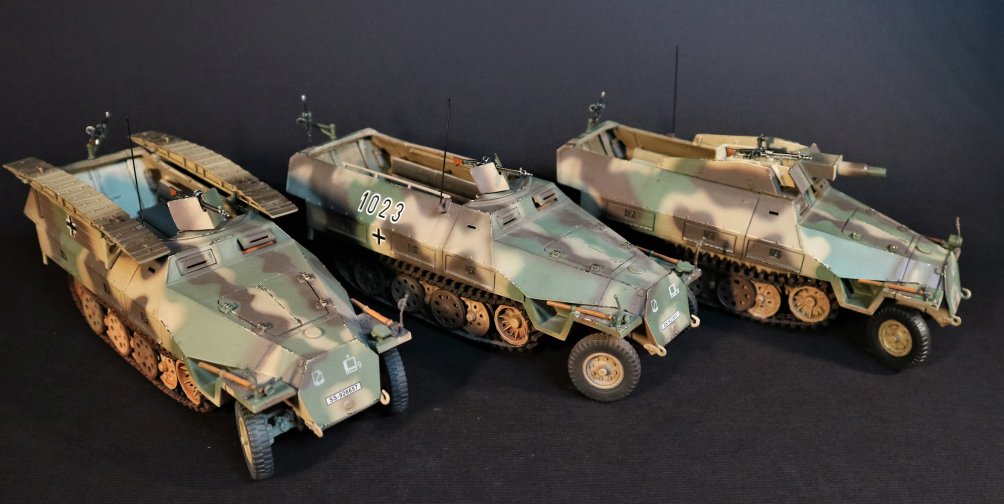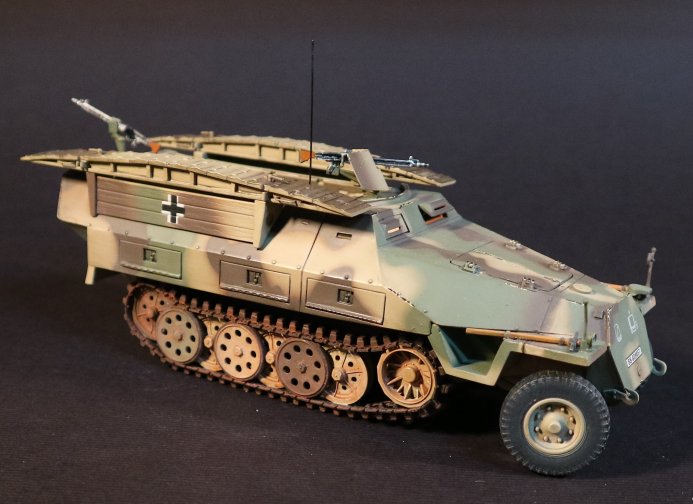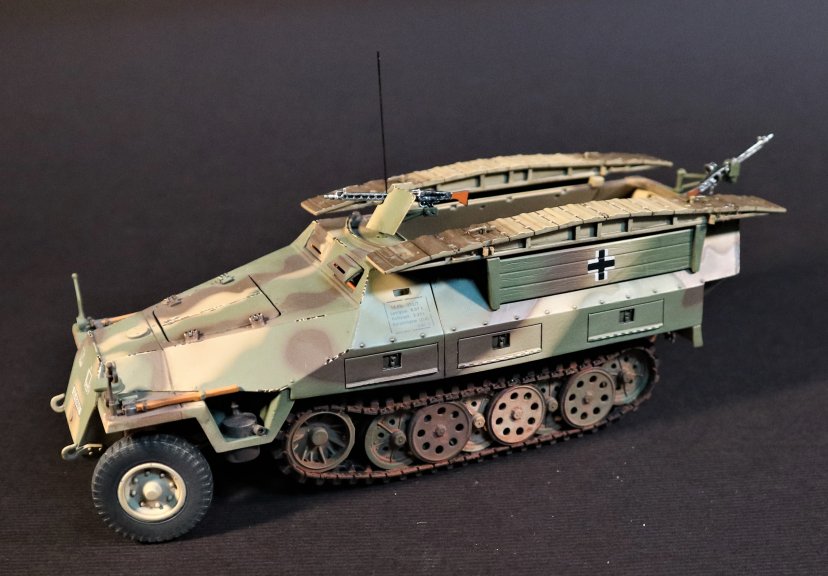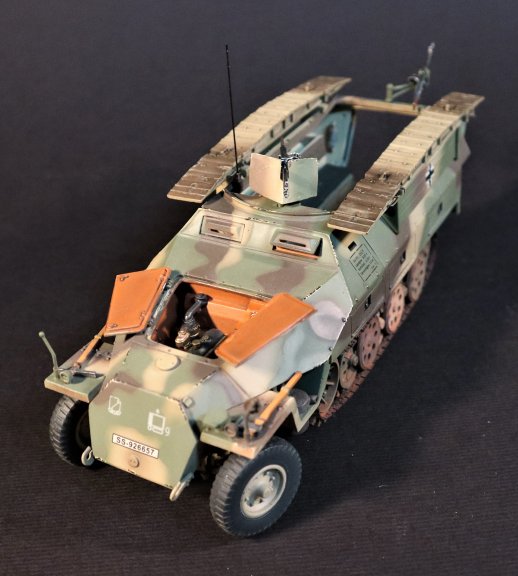- Joined
- Feb 2, 2011
- Messages
- 2,093
NEW RELEASES FOR OCTOBER 2023
THE SECOND WORLD WAR
GERMAN ARMOUR
The Sd.Kfz. 251 mittlerer Schützenpanzerwagen was an armored and fully tracked infantry fighting vehicle designed specifically to provide infantry the capability to match pace with German Panzers during armored operations. No other nation employed a similar vehicle during the war. It was purpose built to truly serve as a vehicle the Panzergrenadiers actually fought from. Its armored body could withstand small arms fire, protecting the mounted troops while they employed the two onboard machineguns along with the soldier's own personal small arms. The SPW was also fully tracked, meaning each of its tracks could be operated independently from the other track, just like a tank. This capability provided the SPW with excellent cross country mobility and allowed the Panzergrenadiers to accompany tanks even in the muddiest conditions. Lastly, the excellent capabilities of the SPW led to numerous specialized variants including versions mounting 7.5cm cannons and versions carrying small bridge sections for the Pioniere (specialized heavy assault troops with engineering skills).

During World War Two, the Waffen SS Panzergrenadiers of the 1. SS-Panzer Division "Liebstandarte SS Adolf Hitler" (LSSAH) earned a fearsome reputation as some of the most ferocious and fanatical fighters of the Wehrmacht.
Of these, the LSSAH Panzergrenadiers most often chosen to serve in the spearhead of LSSAH armored operations, were the mechanized soldiers of the III. Bataillon of SS-Panzergrenadier Regiment 2 (III./SS-Pz.Gren.Rgt. 2).
Equipped with the armored Sd.Kfz. 251 mittlerer Schützenpanzerwagen (SPW) halftracks and initially commanded by Joachim Peiper, the III./SS-Pz.Gren.Rgt 2 was employed in the winter of 1942-43 during Field Marshal Erich von Manstein's brilliant counteroffensive at Kharkov and during the Battle of Kursk in July 1943.
During this time, Peiper's halftrack battalion became famous for their daring shock tactics, often attacking Russian units at full speed with all guns blazing from their SPWs. While the Panzergrenadier owed much of their success to their daring commander, the unit's effectiveness was also due to its ability to fully exploit the capabilities of their SPWs.
Following combat in Russia and refitting in Belgium, the 1. SS-Pz.Div. LSSAH was rushed to Normandy after the successful Allied amphibious landings of Operation OVERLORD. Fighting initially in the British sector, the LSSAH was ground down by continuous combat until the ultimate defeat of the Germans in France. Escaping the hell of the Falaise pocket, the 1. SS-Pz.Div. LSSAH was withdrawn from the front lines to be reformed and refitted yet again. This respite from combat would not last long. In December 1944, the 1. SS-Pz.Div. LSSAH was once again called upon to serve a key role in Adolf Hitler's final, desperate offensive in the West: Unternehmen Wacht am Rhein (Operation Watch on the Rhine)...more commonly referred to as the Battle of the Bulge.
For this last roll of the dice to turn the tide of the war, Hitler chose his favored 1. SS-Pz.Div. LSSAH to serve as the lead division of the operation, with SS-Standartenführer Joachim Peiper, now the commander of SS-Panzer Regiment 1, chosen as the commander of the LSSAH's armored spearhead. For this task, Kampfgruppe Peiper was allocated the Panzer IVs and Panthers of SS-Panzer Regiment 1, the King Tigers of schwere SS-Panzerabeilung 501, and the Panzergrenadiers of SS-Panzergrenadier Regiment 2.
From these troops, Peiper tailored his forces for the coming operation. While the common perception is that Kampfgruppe Peiper began its desperate race to capture the Meuse river crossings with his tanks in the lead, the reality is slightly different. Although ordered to advance as fast as possible, the hilly and winding terrain of the Ardennes and the poor conditions of the roads allowed travel at only medium speed. Consequently, Peiper actually decided to advance with his SPWs in the lead. The Panzers would follow the SPWs and be called forward if resistance was met. Thus, the actual armored spearhead company of Kampfgruppe Peiper (and the initial German spearhead of the entire Battle of the Bulge) was not composed of Panther and King Tiger with huge cannons and thick armor...but rather by SS Panzergrenadiers in their battle proven Sd.Kfz. 251 mittlerer Schützenpanzerwagens!
The SPW spearhead of Kampfruppe Peiper was historically organized as follows:
- 10. Kompanie of SS-Pz.Gren.Rgt. 2 equipped with thirteen Sd.Kfz. 251 SPWs
- a half platoon of Panzerpioniere from 9. Kompanie (Pioniere) of SS-Pz.Rgt. 1 equipped with two Sd.Kfz. 251/7 Pionierpanzerwagens
- a heavy weapons platoon of 12. Kompanie of SS-Pz.Gren.Rgt. 2 equipped with seven Sd.Kfz. 251/9 SPWs mounting 7.5 cm cannon
Sd.Kfz. 251/7 mittlerer Pionierpanzerwagen
The Sd.Kfz. 251/7 Pionierpanzerwagen was the specialized version issued to Panzerpionier of Panzer units. Pioniere were infantry unique to the German forces. While similar to combat engineers, they are more accurately described as heavy assault infantry with specialized engineering skills. The Pioniere supported the assault parties with explosives expertise and by clearing mines, clearing obstacles. The Sd.Kfz. 251/7 was the third abundantly produced version of the SPWwas designed to assist the Panzerpionere in their duties by carrying the extra explosives and specialized tools in its stowage bins. However, the most striking difference between an Sd.Kfz. 251/7 SPW and a standard Sd.Kfz. 251/1 SPW was the addition of two 8-ton Uebergangsschienen (small bridge sections) carried on the upper sides of the SPW. The JJD Sd.Kfz. 251/7 Pionierpanzerwagen carries the markings and Panzerpioniere from 9. Kompanie (Pioniere) of SS-Pz.Rgt. 1.

GA-251/7
THE SECOND WORLD WAR,
GERMAN ARMOUR,
Sd.Kfz. 251/7 MITTLERER PIONIERPANZERWAGEN.
(6 pcs)
model Size 8 ½” x 3” x 3”
(7” x 10 ½” x 5” box size 615g weight)


PLEASE NOTE THIS ITEM IS NOW SOLD OUT.
**PLEASE CONTACT YOUR LOCAL DEALER FOR FURTHER INFORMATION**
THE SECOND WORLD WAR
GERMAN ARMOUR
The Sd.Kfz. 251 mittlerer Schützenpanzerwagen was an armored and fully tracked infantry fighting vehicle designed specifically to provide infantry the capability to match pace with German Panzers during armored operations. No other nation employed a similar vehicle during the war. It was purpose built to truly serve as a vehicle the Panzergrenadiers actually fought from. Its armored body could withstand small arms fire, protecting the mounted troops while they employed the two onboard machineguns along with the soldier's own personal small arms. The SPW was also fully tracked, meaning each of its tracks could be operated independently from the other track, just like a tank. This capability provided the SPW with excellent cross country mobility and allowed the Panzergrenadiers to accompany tanks even in the muddiest conditions. Lastly, the excellent capabilities of the SPW led to numerous specialized variants including versions mounting 7.5cm cannons and versions carrying small bridge sections for the Pioniere (specialized heavy assault troops with engineering skills).

During World War Two, the Waffen SS Panzergrenadiers of the 1. SS-Panzer Division "Liebstandarte SS Adolf Hitler" (LSSAH) earned a fearsome reputation as some of the most ferocious and fanatical fighters of the Wehrmacht.
Of these, the LSSAH Panzergrenadiers most often chosen to serve in the spearhead of LSSAH armored operations, were the mechanized soldiers of the III. Bataillon of SS-Panzergrenadier Regiment 2 (III./SS-Pz.Gren.Rgt. 2).
Equipped with the armored Sd.Kfz. 251 mittlerer Schützenpanzerwagen (SPW) halftracks and initially commanded by Joachim Peiper, the III./SS-Pz.Gren.Rgt 2 was employed in the winter of 1942-43 during Field Marshal Erich von Manstein's brilliant counteroffensive at Kharkov and during the Battle of Kursk in July 1943.
During this time, Peiper's halftrack battalion became famous for their daring shock tactics, often attacking Russian units at full speed with all guns blazing from their SPWs. While the Panzergrenadier owed much of their success to their daring commander, the unit's effectiveness was also due to its ability to fully exploit the capabilities of their SPWs.
Following combat in Russia and refitting in Belgium, the 1. SS-Pz.Div. LSSAH was rushed to Normandy after the successful Allied amphibious landings of Operation OVERLORD. Fighting initially in the British sector, the LSSAH was ground down by continuous combat until the ultimate defeat of the Germans in France. Escaping the hell of the Falaise pocket, the 1. SS-Pz.Div. LSSAH was withdrawn from the front lines to be reformed and refitted yet again. This respite from combat would not last long. In December 1944, the 1. SS-Pz.Div. LSSAH was once again called upon to serve a key role in Adolf Hitler's final, desperate offensive in the West: Unternehmen Wacht am Rhein (Operation Watch on the Rhine)...more commonly referred to as the Battle of the Bulge.
For this last roll of the dice to turn the tide of the war, Hitler chose his favored 1. SS-Pz.Div. LSSAH to serve as the lead division of the operation, with SS-Standartenführer Joachim Peiper, now the commander of SS-Panzer Regiment 1, chosen as the commander of the LSSAH's armored spearhead. For this task, Kampfgruppe Peiper was allocated the Panzer IVs and Panthers of SS-Panzer Regiment 1, the King Tigers of schwere SS-Panzerabeilung 501, and the Panzergrenadiers of SS-Panzergrenadier Regiment 2.
From these troops, Peiper tailored his forces for the coming operation. While the common perception is that Kampfgruppe Peiper began its desperate race to capture the Meuse river crossings with his tanks in the lead, the reality is slightly different. Although ordered to advance as fast as possible, the hilly and winding terrain of the Ardennes and the poor conditions of the roads allowed travel at only medium speed. Consequently, Peiper actually decided to advance with his SPWs in the lead. The Panzers would follow the SPWs and be called forward if resistance was met. Thus, the actual armored spearhead company of Kampfgruppe Peiper (and the initial German spearhead of the entire Battle of the Bulge) was not composed of Panther and King Tiger with huge cannons and thick armor...but rather by SS Panzergrenadiers in their battle proven Sd.Kfz. 251 mittlerer Schützenpanzerwagens!
The SPW spearhead of Kampfruppe Peiper was historically organized as follows:
- 10. Kompanie of SS-Pz.Gren.Rgt. 2 equipped with thirteen Sd.Kfz. 251 SPWs
- a half platoon of Panzerpioniere from 9. Kompanie (Pioniere) of SS-Pz.Rgt. 1 equipped with two Sd.Kfz. 251/7 Pionierpanzerwagens
- a heavy weapons platoon of 12. Kompanie of SS-Pz.Gren.Rgt. 2 equipped with seven Sd.Kfz. 251/9 SPWs mounting 7.5 cm cannon
Sd.Kfz. 251/7 mittlerer Pionierpanzerwagen
The Sd.Kfz. 251/7 Pionierpanzerwagen was the specialized version issued to Panzerpionier of Panzer units. Pioniere were infantry unique to the German forces. While similar to combat engineers, they are more accurately described as heavy assault infantry with specialized engineering skills. The Pioniere supported the assault parties with explosives expertise and by clearing mines, clearing obstacles. The Sd.Kfz. 251/7 was the third abundantly produced version of the SPWwas designed to assist the Panzerpionere in their duties by carrying the extra explosives and specialized tools in its stowage bins. However, the most striking difference between an Sd.Kfz. 251/7 SPW and a standard Sd.Kfz. 251/1 SPW was the addition of two 8-ton Uebergangsschienen (small bridge sections) carried on the upper sides of the SPW. The JJD Sd.Kfz. 251/7 Pionierpanzerwagen carries the markings and Panzerpioniere from 9. Kompanie (Pioniere) of SS-Pz.Rgt. 1.

GA-251/7
THE SECOND WORLD WAR,
GERMAN ARMOUR,
Sd.Kfz. 251/7 MITTLERER PIONIERPANZERWAGEN.
(6 pcs)
model Size 8 ½” x 3” x 3”
(7” x 10 ½” x 5” box size 615g weight)


PLEASE NOTE THIS ITEM IS NOW SOLD OUT.
**PLEASE CONTACT YOUR LOCAL DEALER FOR FURTHER INFORMATION**

